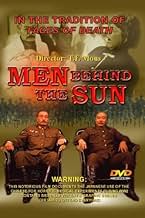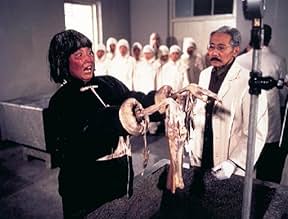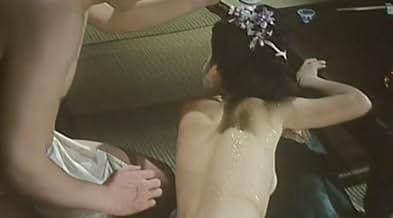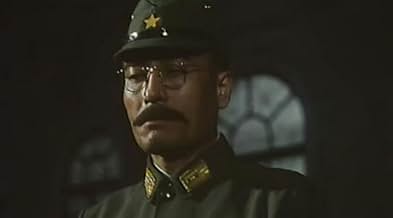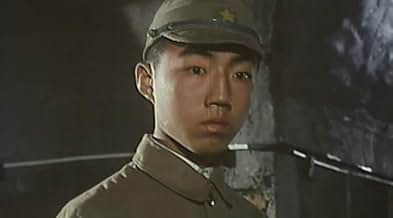AVALIAÇÃO DA IMDb
6,1/10
7,9 mil
SUA AVALIAÇÃO
As tropas japonesas prendem prisioneiros de guerra chineses e russos e os levam para a unidade 731, eles são terrivelmente torturados e experimentados para testar novas armas biológicas.As tropas japonesas prendem prisioneiros de guerra chineses e russos e os levam para a unidade 731, eles são terrivelmente torturados e experimentados para testar novas armas biológicas.As tropas japonesas prendem prisioneiros de guerra chineses e russos e os levam para a unidade 731, eles são terrivelmente torturados e experimentados para testar novas armas biológicas.
- Direção
- Roteiristas
- Artistas
Zhaohua Mei
- Takamura
- (as Zhao Hua Mei)
Runshen Wang
- Camp Lieutenant
- (as Run Shen Wang)
- Direção
- Roteiristas
- Elenco e equipe completos
- Produção, bilheteria e muito mais no IMDbPro
Avaliações em destaque
I saw this for the first time recently n got disturbed badly.
I cudnt sleep or do my workout.
This movie is not supposed to be enjoyed nor shud be viewed for entertainment values. It shud be only seen for sheer enlightening.
The autopsy of an alive child made me lose hope in humanity. The gruesome experiment in the decompression chamber took away my sleep n appetite.
The most shocking aspect is why wud anyone protect a monster like Shiro Ishii. For scientific data?
This movie is not supposed to be enjoyed nor shud be viewed for entertainment values. It shud be only seen for sheer enlightening.
The autopsy of an alive child made me lose hope in humanity. The gruesome experiment in the decompression chamber took away my sleep n appetite.
The most shocking aspect is why wud anyone protect a monster like Shiro Ishii. For scientific data?
This is one of THE most disturbing movies I've seen. The thing that disturbed me the most was that it was based on the events of Squadron 731. The human testing in the movie was well done and pretty realistic. Some scenes were campy, while others made you wanna get up and vomit. The most disgusting to me was the cat thrown in a room of thousands of hungry rats. The rats tore the cat apart, and it was with real a real cat and real rats! No effects! Nonetheless, it was a good movie with a good story. Definitely don't plan to watch this movie with the family (or the cat) after Sunday dinner.
Watching 'Men Behind The Sun' is a very odd experience, because it's difficult to tell what exactly it is trying to achieve. On the surface it is presented as a supposedly serious expose of some of the little known war crimes committed by the Japanese in WW2. But it is made in such a trashy way (compounded by the badly dubbed copy I watched) that it comes across closer to an 'Ilsa, She-Wolf Of The SS' exploitation movie, minus the sex.
The reason this movie is so notorious is mainly because of a handful of scenes. One sequence, the frostbite experiment, is shocking, but obviously special effects, so gorehounds will treat it like a Romero or Fulci gore scene. However, two others, the autopsy scene, and the decompression chamber scene, appear to use real corpses. These are gruesome but strangely fascinating. What really pushes this movie over the edge though are the two scenes which involve animal abuse. One is very short but involves a horde of fleeing rats being burned alive. This scene is obviously real. The other is the notorious segment which involves a cat being eaten alive by rats. This appears to be real, and if it is, it's the most reprehensible thing I've ever seen in a movie. If it is faked it is one of the most convincing special effects I've ever watched, and even so, the cat is obviously highly distressed.
I must admit I still don't know what to think about this movie. If the film makers genuinely intended this to be a serious look at Japanese atrocities I would applaud it for bringing to attention a disgusting series of events that should not be forgotten. However, as I am dubious about their sincerity, I remain nonplussed. I can't really get all high and mighty about it, because after all I did watch the thing, and therefore I would feel like a hypocrite for having done so. All I can say is that if you want to see an extreme piece of film making and are not easily disturbed, 'Men Behind The Sun' is truly unforgettable.
The reason this movie is so notorious is mainly because of a handful of scenes. One sequence, the frostbite experiment, is shocking, but obviously special effects, so gorehounds will treat it like a Romero or Fulci gore scene. However, two others, the autopsy scene, and the decompression chamber scene, appear to use real corpses. These are gruesome but strangely fascinating. What really pushes this movie over the edge though are the two scenes which involve animal abuse. One is very short but involves a horde of fleeing rats being burned alive. This scene is obviously real. The other is the notorious segment which involves a cat being eaten alive by rats. This appears to be real, and if it is, it's the most reprehensible thing I've ever seen in a movie. If it is faked it is one of the most convincing special effects I've ever watched, and even so, the cat is obviously highly distressed.
I must admit I still don't know what to think about this movie. If the film makers genuinely intended this to be a serious look at Japanese atrocities I would applaud it for bringing to attention a disgusting series of events that should not be forgotten. However, as I am dubious about their sincerity, I remain nonplussed. I can't really get all high and mighty about it, because after all I did watch the thing, and therefore I would feel like a hypocrite for having done so. All I can say is that if you want to see an extreme piece of film making and are not easily disturbed, 'Men Behind The Sun' is truly unforgettable.
Man Behind the Sun is a worthy film, and readily smeared through its association with a number of schlock "sequels".
Given that most reviewers here can't read Chinese and are measuring the film by its disgust factor, it's easy to see why "Godfrey Ho" is wrongly credited with directing it, instead of just "parts" 2 and 3. The actual director, Mou Tun-fei (aka T.F. Mous) is alive and well and living in Taiwan at last report. He is also a committed Chinese nationalist, which helps to explain the genuine, almost uncontrollable anger in this film.
The "sequels" on the other hand are money-spinners. Anyone who has seen the original should know there was no scope for a sequel set in a camp that had already been destroyed at the conclusion of WWII. At best, "part" 2 is a remake, and a cheap, shabby one at that.
The film is also careful to note significant historical elements, such as how the US government protected some of the criminals portrayed in this film, partly in order to get hold of the scientific data produced at the expense of the lives of thousands of Chinese civilians. If you read books on the matter you will also discover that the vast majority of Japanese scientists implicated in these experiments went on to enjoy successful careers in Japanese universities.
There was no Simon Wiesenthal to chase up and prosecute these individuals, despite their conspicuous presence under a lengthy US administration, and to this day the two governments prefer not to talk about this particularly vile component of Japan's wartime legacy. "Stuff happens," eh Mr Rumsfeld?
Given that most reviewers here can't read Chinese and are measuring the film by its disgust factor, it's easy to see why "Godfrey Ho" is wrongly credited with directing it, instead of just "parts" 2 and 3. The actual director, Mou Tun-fei (aka T.F. Mous) is alive and well and living in Taiwan at last report. He is also a committed Chinese nationalist, which helps to explain the genuine, almost uncontrollable anger in this film.
The "sequels" on the other hand are money-spinners. Anyone who has seen the original should know there was no scope for a sequel set in a camp that had already been destroyed at the conclusion of WWII. At best, "part" 2 is a remake, and a cheap, shabby one at that.
The film is also careful to note significant historical elements, such as how the US government protected some of the criminals portrayed in this film, partly in order to get hold of the scientific data produced at the expense of the lives of thousands of Chinese civilians. If you read books on the matter you will also discover that the vast majority of Japanese scientists implicated in these experiments went on to enjoy successful careers in Japanese universities.
There was no Simon Wiesenthal to chase up and prosecute these individuals, despite their conspicuous presence under a lengthy US administration, and to this day the two governments prefer not to talk about this particularly vile component of Japan's wartime legacy. "Stuff happens," eh Mr Rumsfeld?
Please do not watch this movie only for its gory scenes. There aren ´t that many of them and you can see similar ones regularly on Reality TV and the likes. The film´s true driving force is strong acting, good script and the veil of foulness, for the story (and even the gore scenes) are based on true facts and documents. You will certainly be disturbed, but rather for the feeling that what you´re watching really happened. Definetly recommended. 7/10
Você sabia?
- CuriosidadesDirector Tun-Fei Mou paid a lot of attention to the film's historical accuracy and sought to create something that very earnestly captured his true-life source material doing years of research. He chose actors who purposely resembled Japanese people of the war era and even cast Korean kids living in China to play the Youth Corp as Mou thought Koreans most resembled Japanese kids of that era. Mou filmed the movie in Harbin, Manchuria where 731 was stationed. He used 731's real headquarters as a location, it was a school at the time of the shoot. When Mou took down the school's name and put the Japanese flag back, it horrified the local elderly who had lived through the war. One particularly upset old lady approached Mou and his crew and said "I knew they'd be back (the Japanese), I just hoped it wouldn't be this soon!"
- Erros de gravaçãoSurgeons cut the stomach of an alive boy without any bleeding.
- Citações
Dr. Shiro Ishii: A small rat can beat a cat. Fleas and germs can defeat bombers and guns. This is... the basic theory behind Squadron 731. It is also my philosophy.
- Versões alternativasThe UK version was cut by 2 minutes by the BBFC to remove a scene where a cat is thrown into a room full of live rats and then killed by them, and to edit shots of rats on fire. Despite the film's graphic violence it received no further BBFC cuts, possibly because the video was given a limited UK release and sold only through Chinese video stores.
- ConexõesEdited into Hei tai yang 731 si wang lie che (1994)
Principais escolhas
Faça login para avaliar e ver a lista de recomendações personalizadas
- How long is Man Behind the Sun?Fornecido pela Alexa
Detalhes
Contribua para esta página
Sugerir uma alteração ou adicionar conteúdo ausente

![Trailer [OV]](https://m.media-amazon.com/images/M/MV5BNzc1ZjYwZmItOTQ3Yy00NjBkLWE2OGYtMDJkZTU0M2UwYzEwXkEyXkFqcGdeQWxiaWFtb250._V1_QL75_UX500_CR0)
